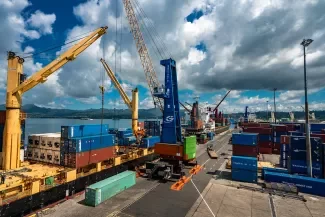ADB Supports South Pacific “Open for Business” with International Arbitration

The South Pacific region used to be one of the few regions in the world without an effective legal framework to resolve cross-border commercial disputes through international arbitration, a private dispute resolution process that involves parties from different countries submitting their dispute to a neutral arbitrator or panel. This form of cross-border dispute resolution and enforcement regime is fundamental to foreign investment, trade, climate finance, and resolves disputes quicker than going to court.
Without this method of resolution, there is an increased risk and cost of doing business and the economic growth potential of the region is stifled.
The Convention on the Recognition and Enforcement of Foreign Arbitral Awards, also known as the New York Convention, is described as the most successful treaty in private international law and is adhered to by more than 170 nations. Studies have shown that when countries adhere to the New York Convention, trade, and foreign direct investment inflows increase along with other positive economic impacts.
ADB has been dedicated to supporting Asia Pacific nations in boosting their economies by acceding to the New York Convention: Papua New Guinea (2019), Palau, Tonga (2020) and Timor-Leste (2023).
Through ADB’s interventions, the South Pacific region now has one of the best and most progressive international arbitration legal frameworks in the world. This development sends a powerful signal to potential trading partners and investors that the South Pacific is open and ready for business and trade.
As an example, Palau's accession to the New York Convention and the enactment of its International Commercial Arbitration Act 2021 provided security to American and Philippine private partners in developing and financing the Palau Solar Photovoltaic (PV) and Battery Energy Storage System (BESS) Independent Power Producers (IPP) Project, a USD25 million project that will supply affordable electricity supply and help build climate and disaster resilience through innovative technologies.
ADB also assisted Fiji, Tonga, and Palau in upgrading their domestic legislation to align with international best practices. These include Fiji's International Arbitration Act 2017; Tonga's International Arbitration Act 2020; and Palau's International Commercial Arbitration Act 2021 which are all based on the 1985 United Nations Commission on International Trade Law's (UNCITRAL) Model Law, with amendments as adopted in 2006. The enactment of a similar Arbitration Bill for Papua New Guinea is currently in progress.
ADB, along with several development partners, also hosted several South Pacific International Arbitration Conferences to continuously promote the efficacy of international arbitration and implement the New York Convention across the region.